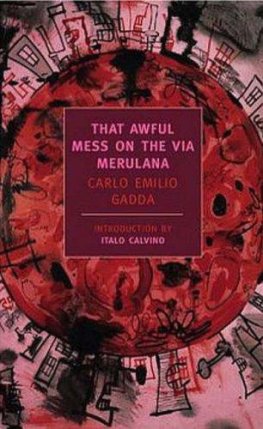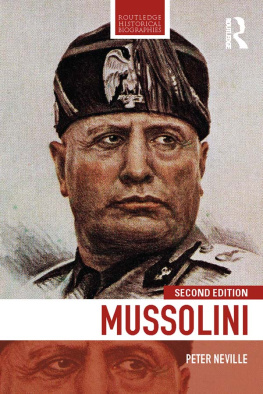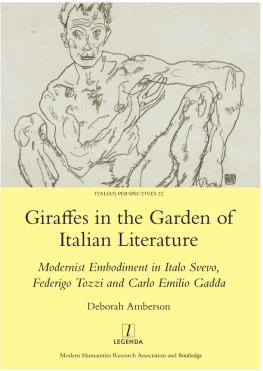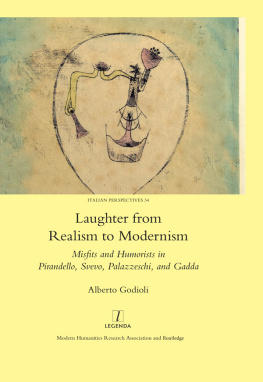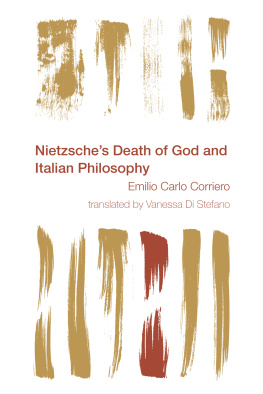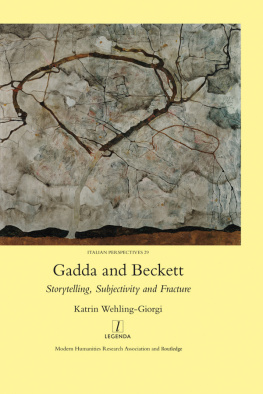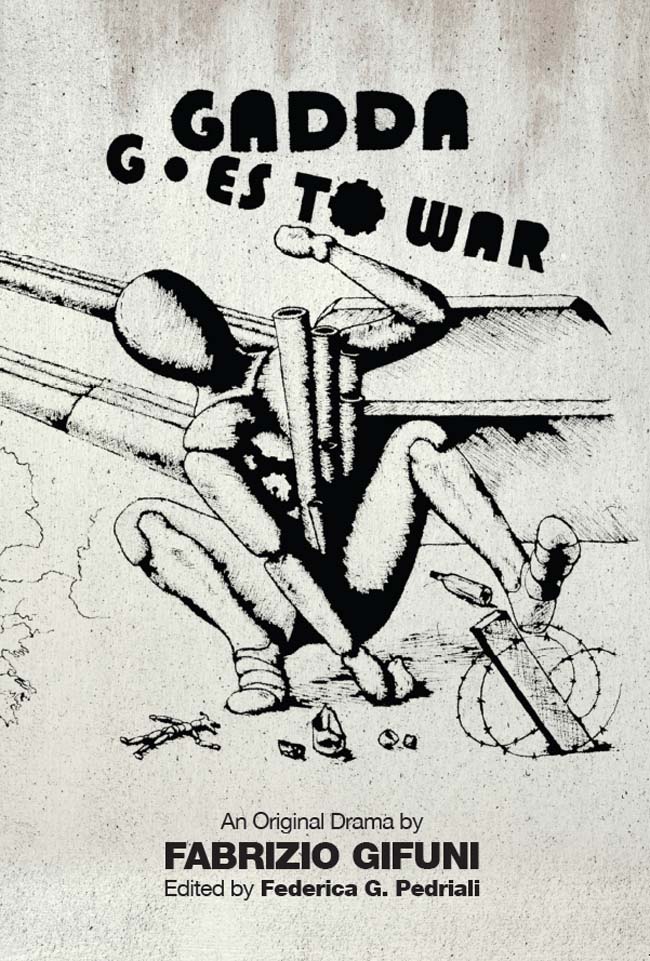Gadda Goes to War
Gadda Goes to War
Translational Provocations Around An Emergency
Presents Fabrizio Gifunis award-winning drama Lingegner Gadda va alla guerra in the English translation, with facing Italian
Edited by Federica G. Pedriali
EDINBURGH
University Press
editorial matter and organisation Federica G. Pedriali, 2013
the chapters their several authors, 2013
text and video recording of Lingegner Gadda va alla guerra reproduced by kind permission of Fabrizio Gifuni, Fondazione Solares delle Arti, Parma, and Minimum Fax, Rome, 2013
translation, Christopher Ferguson and Cristina Olivari, 2013
Edinburgh University Press Ltd
22 George Square, Edinburgh EH8 9LF
www.euppublishing.com
Typeset in 10.5/13 Sabon by
Servis Filmsetting Ltd, Stockport, Cheshire,
and printed and bound in Great Britain by
CPI Group (UK) Ltd, Croydon CR0 4YY
A CIP record for this book is available from the British Library
ISBN 978 0 7486 6871 7 (hardback)
ISBN 978 0 7486 6872 4 (paperback)
ISBN 978 0 7486 6873 1 (webready PDF)
ISBN 978 0 7486 6874 8 (epub)
A Gaddus Scholars publication
Publication sponsored by the Edinburgh Gadda Projects and Finmeccanica UK.
Contents
Acknowledgments
In this project, agents (people) have supported the original text by Fabrizio Gifuni to achieve its translation via combined (and collective) translational strategies involving an extended number of agents (other people), platforms (such as performance and public engagement initiatives) and complementary outcomes (including scholarly events and their further outputs), and resulting in the text feeding back as texts (performance, translation, illustration, subtitles, surtitles, scholarship) to its beneficiaries (again but not conclusively, people). In the end, the concepts behind the book unfolded also as the third edition of the Edinburgh Gadda Prize,Gadda teatro | Scholarship is engagement, Edinburgh 2012 for short. This allowed the bringing together of a further series of firsts among them, the first postgraduate summer school Gaddus Scholars (under the title Great irregulars Body irregular) and the first international Gadda Juniors mobility programme (which resulted in the multimedia installation Hybridity), as well as the UK premiere of Lingegner Gadda va alla guerra, Traverse Theatre, 2022 September 2012. Indeed, very many people scholars, editors, translators, stage managers, technicians, panel judges, teachers, trainers, prize participants, students, pupils, helpers, fundraisers, sponsors, government and education officials have made this level of collective effort possible. We would like to thank them for their commitment, support, vision and active participation with special thanks to Fabrizio Gifuni, Gualtiero Pedriali, Timothy OShea, Dorothy Miell, Arnaldo Liberati, Giorgio Pinotti, Paola Italia, Emilio Manzotti, Andrea Silvestri, Corrado Bologna, Gian Mario Anselmi, Niva Lorenzini, Paolo Bartoloni, Federico Bertoni, Giuseppe Bonifacino, Raffaele Donnarumma, Harald Hendrix, Monica Jansen, Stefano Jossa, Davide Messina, Gino Ruozzi, Maria Bortoluzzi, Giovanna Caltagirone, Giulio de Jorio Frisari, Laura Parola, Emanuele Serafini, Tony Crolla, Cesidio Di Ciacca, Luigi Frigerio, Guido Pegna, Paolo Relli, Laura Pasetti, Ann Marie Di Mambro, Nicola McCartney, David Williams, Jonathan Gibbs, Lefke Kerr, Astrid Jaeckel, Lucinda Byatt, Silvana Vitale, James Clayton Jones, Emma Lacroix, Giuseppe Episcopo, Carlo Pirozzi, Susanna Grazzini, Giulia Trentacosti, Serena Mariani, the students of the Gadda Honours course class 2013, the families hosting the Italian Gadda Juniors, Evan Thomas and the Stills Gallery, Gwen Orr and the staff at the Traverse Theatre, Jackie Jones and the (exceptionally patient) editors at Edinburgh University Press.
The text and the video recording of Lingegner Gadda va alla guerra are reproduced by kind permission of Fabrizio Gifuni, Fondazione Solares delle Arti, Parma, and Minimum Fax, Rome. The extracts from Giornale di guerra e di prigionia, Eros e Priapo and La cognizione del dolore are reprinted by kind permission of Arnaldo Liberati and the Gadda Estate, Garzanti Libri, Milan, and Adelphi Edizioni, Milan.
Abbreviations
Unless otherwise indicated, Gaddas works are referenced giving: (a) title and date of publication; (b) abbreviated volume title (full listing in the Bibliography); and (c) present location in the five-volume edition, plus Indices, of the Collected Works Opere, edited by Dante Isella (Milan: Garzanti, 198893) with the following abbreviations:
| RR I | Romanzi e racconti, Vol. I, edited by R. Rodondi, G. Lucchini |
| and E. Manzotti, Milan: Garzanti, 1988. |
| RR II | Romanzi e racconti, Vol. II, edited by G. Pinotti, D. Isella and R. Rodondi, Milan: Garzanti, 1989. |
| SGF I | Saggi giornali favole e altri scritti, Vol. I, edited by L. Orlando, C. Martignoni and D. Isella, Milan: Garzanti, 1991. |
| SGF II | Saggi giornali favole e altri scritti, Vol. II, edited by C. Vela, G. Gaspari, G. Pinotti, F. Gavazzeni, D. Isella and M. A. Terzoli, Milan: Garzanti, 1992. |
| SVP | Scritti vari e postumi, edited by A. Silvestri, C. Vela, D. Isella, P. Italia and G. Pinotti, Milan: Garzanti, 1993. |
| BI | Bibliografia e indici, edited by D. Isella, G. Lucchini and L. Orlando, Milan: Garzanti, 1993. |
Other abbreviations
| EJGS | The Edinburgh Journal of Gadda Studies http://www.gadda.ed.ac.uk . Journal founded and directed by Federica G. Pedriali. |
| Qdi | I quaderni dellingegnere. Testi e studi gaddiani. Journal founded by Dante Isella and directed by Clelia Martignoni. |
Preface: Gadda (Pasolini) and the theatre. A sacred act of knowledge
Fabrizio Gifuni
The text and the video recording of the performance presented in this volume are part of a wider theatrical initiative that has been developing over time. At the heart of the project was the desire to organise a grand account of the transformation of Italy: what we were, what we have become and what we have perhaps always been. In this way, I thought, we might understand how we can have arrived at this point. A map of the chromosomes of Italy and its people, this is what I had in mind, so that we might better orient ourselves in a present which is too often dark, opaque and dangerous.
For this reason, some ten years ago I began a long and enthusiastic journey with Giuseppe Bertolucci, borrowing the words of two among the greatest Italian writers of the twentieth-century, Pier Paolo Pasolini and Carlo Emilio Gadda. I felt that there was a strong connection there, despite the diametrical opposition in terms of education, artistic vision, language and view of history. Through various phases of work, between 2004 and 2010 two performances came to life: Na specie de cadavere lunghissimo, from texts by Pasolini and from a poem by Giorgio Somalvico, and Lingegner Gadda va alla guerra o della tragica istoria di Amleto Pirobutirro, based on texts by Gadda with interpolations from Hamlet.
What has emerged from this double take is a relentless stereoscope of our recent past. Pasolinis civil reflections on the anthropological transformation of an entire country come together, like the tiles of a unique mosaic, with Gaddas notes on the Great War and his psychoanalytical interpretation of fascism. Two very different artistic and philosophical visions thus get interlinked, the qualifiers standardly applied in this case progressive and conservative finally giving way to the sheer force of two intellects in continuous movement. A furious love for ones country is what provides the common ground: a love which wins these two writers, on the field of battle as it were, the right to pass judgment on what they are witnessing. It is for this reason, I believe, or more precisely, it is because Gadda and Pasolini tear themselves to pieces through their commitment to their country, that their words have, today, a specific and substantial weight, as if they were loaded with a special form of authority. From the act of self-demolition, from the constant shipwrecking of the self, Gadda and Pasolini derive, in fact, the force of their reasoning as well as of their writing. In this spiritual yet secular exercise resides, I argue, the ethical status of their thinking for it is not enough to express high-mindedness and agreeable thought. One must earn the respect of others.


